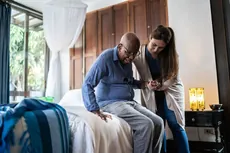How to find the best hospice care
What to look for when you’re deciding on hospice care
+1 more

Hospice care, or end-of-life care, is a type of medical care for people in the final stages of a terminal illness. Rather than focusing on battling illness, hospice care is designed to ensure a patient is as physically and emotionally comfortable as possible.
Choosing the right hospice care is one of the most important decisions you can make for someone. Talk with your loved ones to make sure you understand their needs; if they’re not able to communicate, you can consult with a healthcare professional to discuss available options. The ultimate priority is the patient’s comfort in the last days of their life.
Seeking recommendations from medical professionals and checking for accreditation can help ensure high-quality hospice care.
Jump to insightBeyond general comfort, hospice care should address specific needs such as pain relief, spiritual guidance and bereavement services. Ensuring the provider offers necessary services can improve both patient and family experiences.
Jump to insightAsking about personalized care plans, 24/7 medical support and the availability of inpatient care can help determine if a hospice provider meets your loved one’s unique needs.
Jump to insightHow to find hospice care
When it’s time to find hospice care, there are a few considerations you should keep in mind. Here’s some general advice for anyone looking for hospice care, regardless of their personal circumstances.
- Ask for recommendations: Talk to doctors, nursing homes, family members and anyone else who has knowledge of hospice care. Medical professionals are your best bet when it comes to advice. Look for a home care provider who focuses on hospice care.
- Look for accreditation: Check to see if your hospice care options are accredited by the Community Health Accreditation Partner (CHAP) or the Joint Commission on Accreditation of Healthcare Organizations (JCAHO). Hospices don’t have to be accredited, and those that aren’t still provide quality care. Accreditation simply means a third party has reviewed their services and found them acceptable.
- Medicare certification: A hospice that qualifies for Medicare certification must provide 16 different core (counseling, doctors’ appointments, food preparation, etc.) and auxiliary services (physical therapy, home care). If you’re a Medicare beneficiary, you’ll need to find a hospice that’s Medicare-certified for it to be covered.
- Time in operation: The longer the hospice has been in operation, the more likely it is to have a good reputation. A hospice that’s been operating for more than three years is a good indication of stability.
- Personal relationship: After meeting with the hospice provider, you’ll have a general idea of who’ll be caring for your loved one. You’ll know, for instance, if they’re people you can handle spending some time with. It’s important to make sure you and your loved one get along with the caregivers before you commit to their services.
» MORE: Benefits of respite care
What hospice services to look for
In addition to providing general comfort, hospice care can offer a variety of services. You’ll want to address any specific needs you or your loved one has. Some additional services you should look for:
- Pain relief: If the patient deals with a lot of pain, make sure your hospice care provider can help with this; this service could require medical professionals to administer pain medicine.
- Spiritual guidance: If your loved one has any religious customs you want observed, look for a hospice with a chaplain or religious leader who can offer spiritual help.
- Family help: Find out what the hospice will expect in terms of help from the family. If you can’t prepare food, keep the house clean, change bedpans or administer medication, make sure the care provider will cover these tasks.
- Inpatient options: Most hospice care takes place in the patient’s home, but your loved one might require inpatient care. Inpatient hospice care leases beds in a hospital or nursing facility in order to move patients if they need it.
- Bereavement services: Most hospices offer standard counseling services, but some have specialized bereavement services and support groups for patients and their families. Ask your hospice provider about its bereavement service options to see if any fit your particular needs.
» RELATED: What is the cost of in-home care?
Questions to ask to help find the best hospice care
These questions will guide you in evaluating the quality of care and services available to ensure the best possible experience for your loved one.
- What services does the hospice provide, and are they tailored to my loved one’s needs?
- How does the hospice team communicate with the patient and their family?
- Is there a nurse or doctor available 24/7 for emergencies?
- What is the process for developing a personalized care plan?
- Does the hospice offer emotional and spiritual support for both the patient and family members?
- Are volunteers available to provide companionship and assistance?
- How does the hospice coordinate care with other medical professionals involved in treatment?
- What bereavement services are available for family members after the patient passes?
- How does the hospice handle pain management and symptom control?
- Is there an inpatient facility available if home care is not feasible?
- Does the hospice accept Medicare, Medicaid or private insurance?
Bottom line
There’s usually no easy way to find the right hospice care; it’s likely your search is taking place during a painful and emotional time. Your doctor can make at least a few recommendations for you, though. Meet with each hospice care provider, and choose the one with services best suited for you and your loved one. The most important thing to remember is their comfort — you want to find the hospice provider who’ll help keep them as comfortable as possible.
» LEARN: 10 types of senior living options




